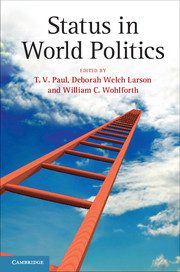Book contents
1 - Status and World Order
Published online by Cambridge University Press: 05 June 2014
Summary
Can the international order be modified to incorporate a greater role for rising or more assertive powers such as China, Russia, India, Brazil, and Turkey? While the rise and decline of major powers cannot be forecast with precision, there is scant uncertainty about the core expectation that relative economic and military clout will shift away from the states that created and have upheld the current international order – the United States and its close allies – in favor of states heretofore thought of as outsiders or as minor players in that order. On the surface, accommodating this shift would appear simple: adjust voting rules in international organizations to reflect new distributions of bargaining power, alter spheres of influence to reflect new military capabilities and interests, and allocate new rights and responsibilities as the situation dictates. After all, nuclear-armed major powers, most of which are democratic, are not going to contest global leadership by resorting to arms. Surely the leaders of modern states in a globalized world will not forgo the massive gains of multilateral institutionalized cooperation over some squabble about the shape of the table and who gets to sit at its head.
Or will they? The ongoing scholarly and public discussion reveals a level of anxiety about rising powers and world order that is hard to explain if people only care about economic prosperity and basic national security. Yet most of what political scientists claim to know about the rise and decline of powers rests precisely on that assumption. The discourse on changing power balances mixes concern over pragmatic adjustments of security- and material welfare-maximizing actors with a vaguer apprehension about clashing national claims to greatness and precedence. To an important degree, the worry is about the search for higher status by emerging powers and the conflict this quest may generate with reigning major power actors. Why do rising powers seek status? What are the mechanisms of status adjustment and accommodation and what are the conditions for use of one rather than another? Can the status aspirations of the rising powers be accommodated without violence, and if so, how?
- Type
- Chapter
- Information
- Status in World Politics , pp. 3 - 30Publisher: Cambridge University PressPrint publication year: 2014
References
- 91
- Cited by



